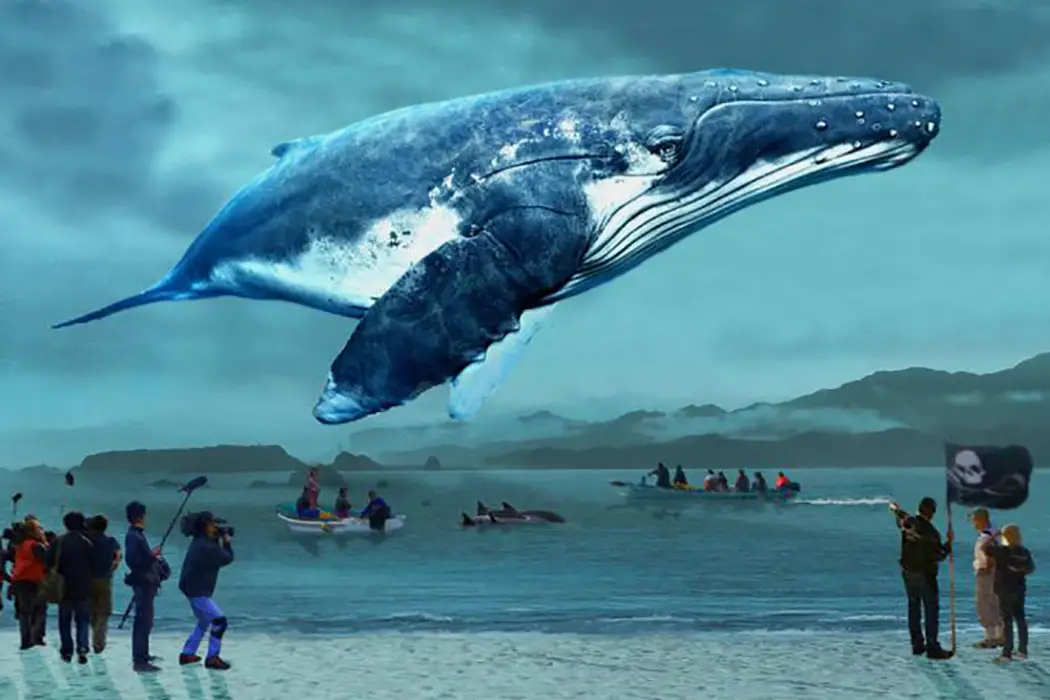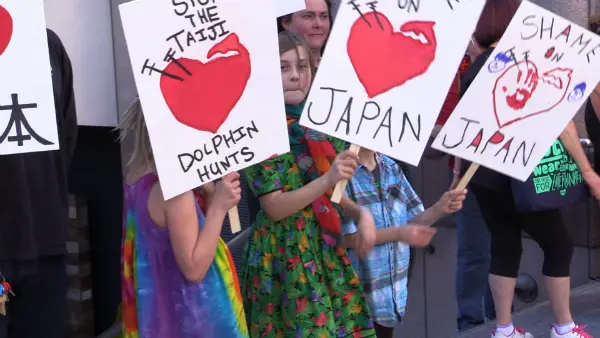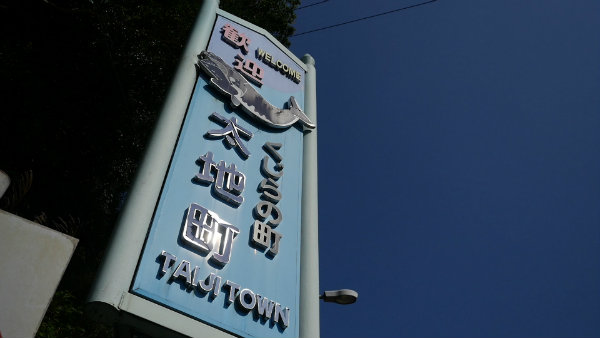“It’s About Saving Human Relationships” – An Interview With A WHALE OF A TALE Director, Megumi Sasaki

Becky spends her days working in TV and she spends…
The subject, whaling, is an eternally controversial one, particularly after the release of Oscar-winning documentary The Cove in 2009. Bringing whaling to an international platform, The Cove wasn’t exactly unbiased in its representation of the whalers in the small town of Taiji. Megumi Sasaki’s new documentary A Whale of a Tale charts the fallout from The Cove in Taiji, the changes that have occured in the town and the bizarre relationship between the town’s remaining whalers and the (mostly foreign) protestors and activists.
Sasaki and her team follow journalist Jay Alabastor, an American who has lived in Japan for over 18 years, as he tries to understand the friction between this small town and how the world’s media has portrayed them.
A Whale of Tale is less about showing both sides of the argument and more about the realisation that there aren’t any ‘sides’. Neither side are monolithic groups, and there are many different justifications, reasons and motives to be pro-whaling or against it. A Whale of a Tale strips away the boundaries of ‘right’ and ‘wrong’ and focuses on humanity rather than morality. An accomplished film, it fills in many of the gaps left by the media regarding whaling, and gives a glimpse behind the vilified people of one of Japan’s most infamous whaling towns.
We caught up with director Megumi Sasaki about The Cove, why she wanted to make this film, and the experience of filming both sides of the story.

Becky Kukla for Film Inquiry: First of all, let me say congratulations on such a thought-provoking documentary! Can I ask what inspired you to tackle the still very controversial subject of whaling?
Megumi Sasaki: Thank you! I’ve lived in New York for 30 years, I always wondered why the US media coverage on whaling was unanimously critical, as if whaling countries were committing a serious crime. Did they forget that whaling was a big part of the history of US and other European nations and they were hunting whales to the brink of extinction? In the US, it is normal to hear both sides of the argument on such controversial topics as gun control, abortion, or even President Donald Trump. When it comes to whales and dolphins, we hear only one side of the story.Why?
In 2009, I was shocked to see The Cove. It’s a very powerful film, emotionally engaging, and great storytelling but I sensed their depiction was not complete. Although dolphin hunting is legal in Japan, none of the hunted species are on the endangered list, and the Taiji hunts represent only 10% of the country’s total catch of dolphins. The film selected a handful of Taiji fishermen and portrayed them as “notorious villains.”
For me, the problem is a lack of information. I felt an urge to show a more comprehensive picture of the issue and particularly give a voice to those who don’t have one in this controversy, namely the small town of Taiji and the fishermen.
A Whale of a Tale is almost the ‘unofficial’ sequel to The Cove. The two films naturally draw comparisons. Were you anxious at all about taking on such a hugely popular film?
Megumi Sasaki: I don’t see the film as the sequel to The Cove. I was inspired by the film and it was simply the entry point. I was concerned that it would be seen as a ‘sequel’ to The Cove or fighting The Cove. The two films take place in the same town, featuring the same people, but the theme is completely different. The Cove condemns the town and their practice of dolphin hunting unanimously. A Whale of a Tale is about communication and understanding each other despite the difference of opinions, values or cultural background. My intention is to portray Taiji as a microcosm of the world we live in today, where we fight, hate, and accuse the other side of the argument while all along insisting our righteousness.
You’ve sometimes spoken about The Cove being an ‘activist’ film – could you talk a bit more about why you feel that way, and how A Whale of a Tale is different?
Megumi Sasaki: There’s nothing wrong about activists or activist films at all. I don’t say that in a critical way. Documentary films can be a powerful tool or weapon to push the agenda and many films are made for that purpose, particularly in the US. When the film has a certain agenda, the film is set to tell the story in a certain way, with a certain view and facts that fit the film’s agenda. That’s the case for The Cove in that filmmakers have an agenda to stop dolphin hunting in Taiji. Naturally, the film casts a negative light on the town and fishermen.
I’m not an activist. I don’t have an agenda. I’m just a filmmaker and a storyteller. I made A Whale of a Tale just to tell a story as balanced and fairly as possible. I don’t cast a negative light on anyone. It’s not about who’s right or wrong, bad or good. I just want the audience to think and feel in whatever they like. I feel sympathetic to the Taiji whalers and the town of Taiji as they happen to be a target of global criticism, just because what they’ve been doing for centuries doesn’t fit the global standard of 21st century. But equally I didn’t make this film to protect the town or their practices.

Jay is such an integral part of the film – providing a platform for the Taiji people to be able to talk about their experiences post The Cove. How did you end up filming with Jay and what was your experience like working with him?
Megumi Sasaki: It was the end of 2014 when I met Jay. He was quietly living in Taiji, very considerate to the Taiji people under the sensitive circumstances. He’s more Japanese than I am, understanding the culture and the manners of a small town in Japan. I met him through the curator of Taiji Whale Museum. I didn’t know about him at all, because he was very low key, never vocal on social media or the Japanese media. When I found out about Jay, I was just about to leave the town, but extended the stay a bit so that I could meet him. Instinctively I thought he would be a very important character in the film. We hit it off immediately. He is an American living in Japan for a long time and I’m a Japanese living in US for 3 decades, we shared the same view that is the ridiculousness of the division and hate that had been caused over whale and dolphin controversies between the two countries we love dearly.
He said he was at the dialog event in 2010 covering it as AP reporter. It was such a great luck for us, but we didn’t know until the end of the editing process that he’d be the guide of the story. We are very fortunate to have him in the film.
What was your experience of filming with the whalers in Taiji? Did you find they were more skeptical of journalists/filmmakers because of The Cove?
Megumi Sasaki: I’m so grateful for the whalers who agreed to be a part of the film. It’s not easy for them after being portrayed as villains by the Oscar-winning film and the world hating them. I believe it was more challenging on their end, not mine. They were probably a bit skeptical at the beginning and reluctant to talk to me, and that’s totally understandable. It takes time to develop any relationship and gain trust. But I made it very clear from the beginning that the film is not designed to support their practices, but to show all kinds of opinions.
I was very careful to be very open and honest about that. At the end, they trusted us fully allowing us to get on their boat to film. That’s a big deal because they hardly ever do that to any media.
A Whale of a Tale really captures both viewpoints – activists and the people of Taiji. Was it important for you to make sure that both sides were represented?
Megumi Sasaki: Absolutely. I wanted to show a whole picture presenting different perspectives of this issue. A Whale of a Tale is a human drama, depicting people fighting and hating each other over whales and dolphins, questioning how can we come to an understanding despite personal differences. It’s not about saving dolphins or whales. It’s about saving human relationships.
This interview has been edited for clarity.
A Whale of a Tale is out in selected US Cinemas. The UK release date has yet to be confirmed.
Does content like this matter to you?
Become a Member and support film journalism. Unlock access to all of Film Inquiry`s great articles. Join a community of like-minded readers who are passionate about cinema - get access to our private members Network, give back to independent filmmakers, and more.
Becky spends her days working in TV and she spends every other minute writing about cinema, TV & feminism. Based in London, she also likes drinking gin, re-watching 'The X Files' and writing about on-screen representation and all manner of things over at femphile.com













